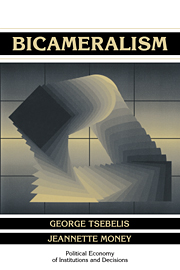Series editors' preface
Published online by Cambridge University Press: 02 December 2009
Summary
The Cambridge series on the Political Economy of Institutions and Decisions is built around attempts to answer two central questions: How do institutions evolve in response to individual incentives, strategies, and choices, and how do institutions affect the performance of political and economic systems? The scope of the series is comparative and historical rather than international or specifically American, and the focus is positive rather than normative.
Tsebelis and Money make a path breaking contribution to the “transactions benefits” theory of political institutions, which holds that a role of institutions is to prevent some collective choices from arising, or otherwise limit the number of enforceable policy outcomes. By doing so, institutions can provide outcomes or opportunities for transacting that improve on the status quo, and that would not happen in their absence. The intuition of Tsebelis and Money's work is that outcomes in a bicameral legislature are both political and efficient. By the latter they describe a form of stability; namely, the bicameral outcome has to be overturned by two majorities, whereas outcomes in either unicameral legislature of which the bicameral one is composed are more prone to being overturned, more prone to cycling, and thus less likely to produce an outcome and to remain at the status quo. Politics is also always likely to be involved no matter what the second chamber does, whether it contributes information or expertise or represents the preferences of more and different people. When different preferences are involved, bicameralism can frustrate several tyrannies: of the majority (by supplying some minority a veto), of the minority (by involving more nearly 50 percent in outcomes), of colluders, or of agenda setters.
- Type
- Chapter
- Information
- Bicameralism , pp. xi - xiiPublisher: Cambridge University PressPrint publication year: 1997

